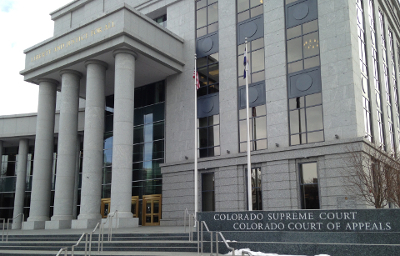By Jeffrey A. Roberts
CFOIC Executive Director
It happened to be Groundhog Day on Thursday when a House committee killed Rep. Polly Lawrence’s latest effort to make administrative records of Colorado’s judicial branch subject to the state’s open records law.
HB 17-1029 met the same fate as last year’s proposal: The House State, Veterans and Military Affairs Committee rejected it on a party-line vote with Democrats opposing the measure.
Two years ago, a House committee defeated a related bill by Lawrence, R-Roxborough Park, to cover the State Public Defender’s Office under the Colorado Open Records Act (CORA).
 “I can’t get past my concerns about the constitutionality of this,” said Rep. Mike Foote, D-Lafayette. He and other lawmakers who voted against HB 17-1029 pointed to a provision in the Colorado Constitution giving the Colorado Supreme Court authority to make “rules and regulations.”
“I can’t get past my concerns about the constitutionality of this,” said Rep. Mike Foote, D-Lafayette. He and other lawmakers who voted against HB 17-1029 pointed to a provision in the Colorado Constitution giving the Colorado Supreme Court authority to make “rules and regulations.”
The Supreme Court did just that in 2015, enacting rules of access to the judicial branch’s administrative records that are similar to CORA in many ways.
A key difference is that internal investigative files on judicial branch employees are not available for public inspection, except for the outcome of an investigation. Under CORA, which covers all other government employees in the state, internal affairs files are presumed to be open for inspection after an investigation is complete, except for portions that contain highly personal or private information unrelated to work performance.
“A staff member in the legislative branch is subject to open-records requests. Why isn’t an equal staff member who works under the judicial branch not subject to the same requests?” Lawrence said. “It’s only because of the branch of government that they’re working in.”
The judicial branch is exempt from CORA because of two Colorado court rulings, most recently Gleason v. Judicial Watch. In that 2012 decision, the Colorado Court of Appeals appeared to leave it to the legislature to define the judiciary as a state agency for CORA purposes.
“This is our opportunity to act,” Lawrence said. She added, “It’s the legislature’s job to write laws. It’s not the judicial branch’s charge to write laws.”
Lawrence acknowledged the Supreme Court’s constitutional rule-making powers, but argued that those powers are “supposed to be focused on the administration of the court.” The Court, she said, is “not supposed to be writing, essentially, laws that usurp the authority of the legislature.”
But Supreme Court Justice Monica Márquez testified that HB 17-1029 is unnecessary and would “create a potential conflict” between CORA and the Court’s rules of access to the judicial branch’s administrative records. Those rules have worked well, she told the committee, adding that any concerns about them should be brought to the branch’s Public Access Committee.
Amy DeVan, an attorney representing the Colorado Bar Association, also testified against the bill. “This is really an issue of semantics,” she said. “The judicial branch is as transparent as the other branches of government.”
But Peter Coulter, a judicial branch watchdog, said many people have “lost trust in the judiciary because things are not transparent … If this judiciary is not transparent and accountable, everyone questions their ability to get a fair hearing.”
HB 17-1029 was supported by the Colorado Press Association and the Colorado Broadcasters Association.
The bill also would have amended CORA to specify that certain personal information is exempt from disclosure, including a person’s home address, phone number, Social Security number and birth date. CORA already exempts most of that information from disclosure if it is part of a public employee’s personnel file.
Follow the Colorado Freedom of Information Coalition on Twitter @CoFOIC. Like CFOIC’s Facebook page. Do you appreciate the information and resources provided by CFOIC? Please consider making a tax-deductible donation.




